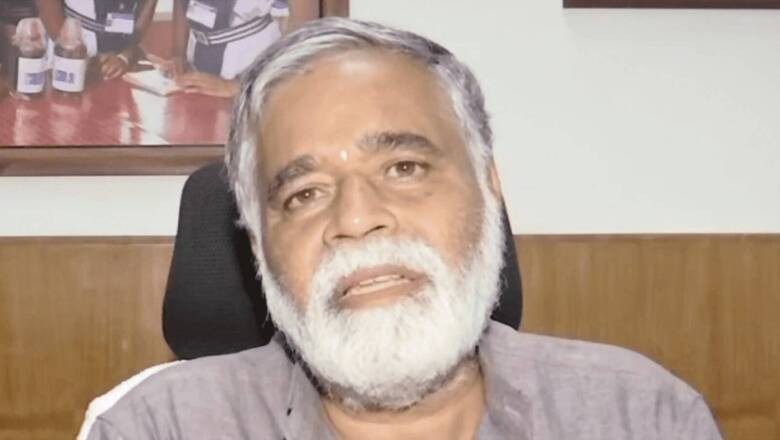
views
“If the Congress is bent on bringing in the ‘Italian education policy’, we will definitely replace it with the ‘Nagpur Education Policy’,” said Karnataka’s primary and secondary education minister BC Nagesh to News18.com. He was reacting to the opposition Congress’s allegation that the BJP was trying to “saffronise” education in the southern state.
Speaking exclusively to News18.com, Nagesh explained the reasoning behind the changes being made in Karnataka’s state syllabus. He called it an effort to increase the awareness of students about the contributions of those such as Rashtriya Swayamsevak Sangh (RSS) founder Dr Keshav Baliram Hedgewar, freedom fighters like Onake Obavva and Kittur Rani Chennamma among many others, and “not glorify foreigners who plundered and tried to change the culture of India”.
Karnataka Congress chief DK Shivakumar had said that the changes that were being made to textbooks by including speeches of Hedgewar, introducing the Bhagavad Gita, and removing chapters related to Tipu Sultan, Periyar, or Sree Narayana Guru were part of the BJP’s efforts to saffronise education.
“We are trying to imbibe in our students various aspects of Indian cultural history, nationalism, and the need to read and gain knowledge about our great country, which is one of the oldest civilisations in the world. A student should feel inspired to read more about our country through their texts,” said Nagesh.
The minister said that for several decades a feudal system of education was being followed and it was time to change that. He also dismissed allegations made by DK Shivakumar about the removal of chapters related to Sree Narayana Guru and Bhagat Singh from school textbooks.
“We have not removed any of the chapters related to Narayana Guru, Periyar, or Bhagat Singh. They are doing it just to create an issue,” he said.
The minister argued for the need to read and understand the speeches of Dr Hegdewar as a freedom fighter and nationalist. Nagesh said that both the Congress and communists, who had ruled the country for decades, had buried nationalist ideologies and it was necessary for children to be exposed to them now.
He said that the speeches made by the RSS leader would instil nationalism and pride for one’s country, which the children would be exposed to only through their textbooks.
When asked why the changes were being made now, Nagesh said that every five years, the education department reviews subjects and the relevance of chapters that are being taught in schools.
“We had books that at first said that the sun rose in the east and set in the west. Then there were Christian books that said that the world was flat. Galileo was punished for declaring it was round. We believe that textbooks should give way to new ideas, challenge the thought processes of children and ensure that they remain updated while keeping the history and culture of India intact,” he added.
Alleging that the Congress was creating unnecessary issues about the changes being made, Nagesh questioned the party’s intent. He said that there were many lessons like Akbar the Great, the life and times of Indira and Rajiv Gandhi, etc, that have been put in the history books.
“Why didn’t anybody challenge that? What was the relevance? When the BJP makes a change they charge at us? By adding Hedgewar’s speeches we are creating an atmosphere for children to be inspired, inculcate patriotism, and understand the ideology,” he said.
On the inclusion of Hedgewar’s speeches, Nagesh said this was not part of the examinations but a supplementary text.
“We are not forcing anybody with any ideology. There is nothing wrong with it. We have only introduced his speeches to help the young kids choose the right role model for themselves,” he said.
According to Nagesh, India’s rich history should be narrated from the right perspective and not through the eyes of an “outsider” like the British.
“The East India Company came to India to trade and slowly they took over our land and ruled over us for almost a century. They tried to change the culture of our country and the thinking of our people and that is what our young generation today is learning. We are making that big change where we showcase India’s glorious culture and scientific prowess,” Nagesh explained, claiming that the system still followed an archaic pattern set by the British and that has to be changed.
When asked why works of progressive thinkers like Kannada poet P Lankesh, the founder-editor of ‘Lankesh Patrike’, AN Rao, and prominent Muslim Kannada writer Sara Aboobacker were removed, the minister reasoned that there was a need to bring in subjects that would enrich the children’s culture.
“There is no particular reason behind removing a chapter. The volume of the textbook cannot be changed. So in order to add something new, we will have to remove something. That’s all. There is no ulterior motive,” he said.
Nagesh said that the Congress under chief minister Siddaramaiah had removed many works of great Kannada writers and poets and there was no protest then.
The education department has re-introduced the works of several leading writers including that of Kuvempu (the first Kannada writer to receive the Jnanpith Award), who has worked extensively on children’s literature, and ‘Rashtrakavi’ M Govinda Pai.
On the language controversy, Nagesh reiterated that the basics of education should be taught in one’s mother tongue.
“It could be any mother tongue. The NEP (National Education Policy) is also very clear about what languages can be opted for by the students. The choice is with them. What Amit Shah said was if there is a choice between English and Hindi as a medium of communication, English is not an Indian language,” Nagesh said.
Sanskrit is a language that binds all Indian languages and it also helps us understand Indian sanskriti (culture) better, he added.
Read all the Latest Politics News here













Comments
0 comment